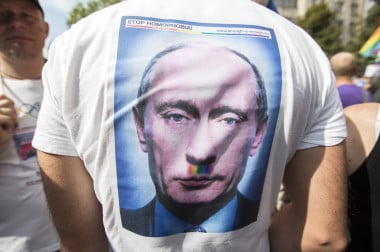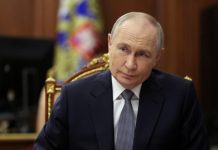Spanners need to be thrown into Russia’s lie-machine – but how?
The British humourist PG Wodehouse made five light-hearted radio broadcasts about his life during internment under the Nazis; he faced only social censure, and lived abroad ever after. The Mussolini-loving crackpot American poet Ezra Pound fared worse. He was arrested for treason after the war. “Lord Haw-Haw” (William Joyce) was hanged – wrongly, as he was from neutral Ireland – for being the voice of Hitler’s English-language radio.
The dilemma now is how to apply pressure to those who help the Putin regime use information as a weapon. The Kremlin is shovelling money into a new propaganda outfit called Sputnik, to complement the venomously anti-Western RT (formerly Russia Today). What do you do if, for example, you are asked to appear on one of these channels?
If it is a pre-recorded programme, just say no. Any benefit from contesting disinformation is outweighed by the downside: stoking the illusion that these outlets are engaged in real journalism. They are not: they peddle falsehoods which serve a murderous, thieving, warmongering regime.
On a live programme, there is another option: sabotage. In 2013, the American journalist Jamie Kirchik memorably donned rainbow ‘gay pride’ braces (suspenders, in American English) when he ambushed RT. He ignored the supposed subject of the show: the sentencing of Bradley (now Chelsea) Manning for passing secrets to WikiLeaks. Instead he berated Russia for its brutality towards gays and asked the presenters of the show how they could sleep at night given their shameful collusion with the regime.
I think that is brave but too risky. The channel can cite such appearances as a sign of its fair-mindedness. And to the casual viewer, the rights and wrongs of a television spat are not always obvious – the guest who interrupts the host and refuses to stick to the topic can seem boorish, not heroic.

It is tempting to shun all contact with anyone from the lie-machine. But where to draw the line? What about debating with Kremlin stooges when they appear in media outlets in the West? If their most formidable critics hold back on principle, they will get an easier ride.
These worries are not confined to Russia. Reputable historians of the Holocaust do not generally take part in debates with the cranks who believe that it never happened. Similarly, Richard Dawkins, the great evolutionary biologist, refuses to debate publicly with creationists. The deniers claim persecution, which strengthens their case. But bestowing legitimacy would strengthen it even more.
In the messy Russian media world, distinctions are particularly hard to draw. Masha Gessen (disclosure: a friend) recently walked out of a pre-recorded discussion on American radio in protest at the inclusion of Anna Arutunyan, another Russian writer whom she counts as part of the Kremlin’s propaganda effort. But others – including respectable commentators – thought that was wrong. At what point in the past 20 years of decline did it become irredeemably disgraceful to work for a state-financed, or state-linked outlet? Gessen herself once edited a popular geographical monthly that had a board of trustees headed by Vladimir Putin. No easy answers there.
The sharpest questions are for Western media bosses. I think anyone who works for Sputnik or RT disqualifies themselves from reputable employment in future. Many would think this too harsh; I think that principle is essential. Similarly, editors who would find the very idea of a ‘balanced’ debate on rape, race or homosexuality offensive still treat the Kremlin viewpoint as legitimate. They also expect broadcasting contributors to behave civilly.
Not any more. For my part, when I am next on air with a Kremlin propagandist, I will point this out – as rudely as necessary.
By Edward Lucas, www.europeanvoice.com.





